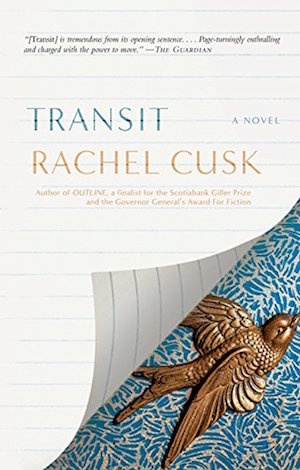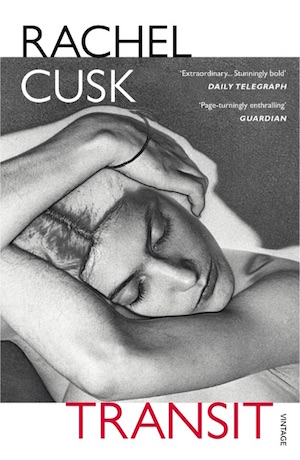Fiction – Kindle edition; Vintage; 272 pages; 2016.
Let me get one thing out of the way: when Rachel Cusk’s Transit was named on the 2017 Giller Prize shortlist my heart sank. That’s because I’d read her previous novel, Outline, when it was shortlisted for the same prize in 2015, and I didn’t much like it. Knowing that this was a follow-up, I expected I probably wouldn’t like this much either. I was right.
A new life in London
Transit picks up where Outline leaves off — though, unusually, you don’t need to have read the first novel to understand the second.
The narrator, Faye, is a writer with two young sons. Newly divorced, she returns to London to start her life afresh. She purchases an ex-council flat in need of serious renovation and finds that her neighbours aren’t particularly pleasant, but doesn’t let this bother her.
There’s no real plot. The narrative revolves around a series of interludes or interactions that the narrator makes with other people — a varied cast including an ex-boyfriend, a builder, one of her students, an unmarried friend and her hairdresser — as she goes about her day-to-day life as a creative writing tutor. This lends Transit more the feel of a collection of short stories, rather than a novel.

Unusual structure
This unusual structure does achieve one thing: it slowly builds up a picture of Faye, a passive character who doesn’t shy away from casting judgement on other people. She’s often full of cod philosophy and is (wearily) opinionated, but she’s not particularly endearing.
For instance, during the course of the novel, her children are staying with their father while the builders work on her apartment, but every time they call her she seems cross that they’ve interrupted her day. Even when they call in tears, she doesn’t seem to offer much by way of maternal consolation.
The fragmentary nature of the story is not helped by the aloof tone of voice that is adopted throughout. While the writing is eloquent and insightful, dotted with wisdom and a pseudo intellectualism, the dialogue often feels contrived and not particularly authentic. Nothing ever seems to properly gel.
Despite this, I did enjoy specific chapters (the one set in the hairdressing salon was strangely engaging), but overall I found Transit to be a chore to read and I came away from the entire book feeling mostly ambivalent about it. I think it is fair to say that Rachel Cusk is simply not a writer for me, but you may find otherwise.
This is my 3rd book for the 2017 Shadow Giller Prize.


This does seem to be a struggle for lots of people. I’ve not read any Cusk, I mean to at some point but I’m in no rush!
LikeLike
You either like this kind of style or you don’t. She’s clearly a brilliant writer, but I find that having stories filtered through a passive narrator doesn’t make them very engaging.
LikeLiked by 1 person
So I’m guessing this is your last Rusk novel? I haven’t read any.
LikeLike
That’s a good guess, Guy 😉
LikeLike
I actually rather like Rachel Cusk, but I know she is a bit of a marmite writer. You are right: her main characters is oddly passive and never endearing, but they are like mirrors reflecting the world around them, or anthropologists. In a way, it seems to me that she is implying we are made up of our daily interactions – and her unmotherly interactions with her children are as much part of her as the conversations with neighbours and friends. It is true that the protagonist seems oddly aloof, not overly interfering with the people around her, but I wonder if that is because of the divorce she is going through. I’m finding it hard to interact with real people (and prefer the online ones, almost) for that reason.
LikeLike
Interesting points. I did wonder whether she was strangely disengaged from her children because she had other things going on, but it came across as cruel and self-obsessed. I can understand the appeal of Cusk as a writer, but it’s not a style/approach I like very much.
LikeLike
Were you able to work out why the hype exists? Is it something to do with the narcissism that you describe?
LikeLike
No idea. I couldn’t figure it out last time either. I suspect it’s because she’s doing something different by subverting the usual conventions of the novel, but this type of structure/narrator/passivity doesn’t work for me
LikeLike
It doesn’t sound as if it would work for me either, thanks for the warning:)
LikeLiked by 1 person
My pleasure 😇
LikeLike
The controversy for many, fond of Cusk or not, is that only in Canada is an author who happens to be born here eligible for awards, even if they left as a child, grew up and are long settled and working elsewhere. This prize should be for Canadians or landed immigrants living and working in Canada. The corollary is the Canadian artists who leave and live and work long term outside the country but still apply for and receive Canada Council Grants.
Rant over (and I do not understand the appeal of Cusk either, by the way).
LikeLike
We had that in Australia too when Evie Wyld, a writer based in the UK (and to my knowledge never resident in Australia), won the Miles Franklin a few years back. It seemed to defeat one of the purposes of the prize: to champion Australian fiction and Australian writers in an industry often subsumed by the wider world of US and UK lit.
LikeLiked by 1 person
I have both Transit and Outline sitting around on TBR piles somewhere. Opinions seem so varied on both of them that one day I’m filled with enthusiasm to read them, the next I don’t think I’ll bother! I will make the effort one day though …
LikeLike
Both are such marmite books that I do think they are worth reading if only to see whether you love or hate them
LikeLike
I liked Outline, despite really struggling with Cusk’s earlier novels Arlington Park and In the Fold, so I might have to try Transit. I’m not sure what it was about Outline that made it work for me when the others didn’t, though – perhaps the writing just felt more fluid and less self-conscious.
LikeLike
If you liked Outline, you will like Transit. The stories are more diverse and more interesting in this one, I think.
LikeLiked by 1 person
Are you worried her third novel in this “series” will show up on the shortlist in two years? 😉
LikeLike
The thought had crossed my mind! 😱
LikeLiked by 1 person
This one doesn’t sound like I would like it any better than Outline.
LikeLike
That’s probably a fair assumption; the style is more of the same.
LikeLiked by 1 person
Yeah, I don’t think I’ll be trying it.
LikeLiked by 1 person
I’ve never read Cusk. I do likebooks with this kind of structure but this sounds distancing. I’m interested to try her work though at some point.
LikeLike
Don’t let me put you off, Cathy. You should try it to see what you think.
LikeLike
Creative writing courses have a lot to answer for, even if the do connect worthy authors with a liveable income. First they practiced all their theory on us, all that irony and truthiness, now we have to endure them as characters in their own works. Tell me the protagonist is not writing a novel about a creative writing lecturer!
LikeLike
Oh, this made me laugh, Bill!
And you’re right: creative writing courses DO have a lot to answer for!
LikeLike
Cusk has borrowed heavily from Amos Oz for her format
Graham Thomas
LikeLike